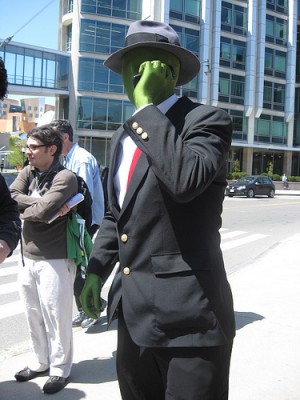Who Are Anonymous?
 In an age where individual privacy is dead yet corporate structure easily dilutes personal responsibility to nothing, a strange cadre has emerged. With no central organization, no stated goal, and no membership list, they have earned the name “Anonymous”.
In an age where individual privacy is dead yet corporate structure easily dilutes personal responsibility to nothing, a strange cadre has emerged. With no central organization, no stated goal, and no membership list, they have earned the name “Anonymous”.
Why Anonymous? Why not a catchy counterculture label of choice? It has stuck for the same reason that the words “peace activist” are spit from the lips of news anchors with incredulity that anyone would actually bother. War makes quite a bit of money after all, and those who benefit decide what is news.
Any label, any characteristic, any identifying mark can be used to stereotype, to appeal to dark tribal instincts and create the fear of the “other” and external attack. Someone working toward something as abstract and universally desirable as peace would seem inoffensive, but there is certainly something a speaker can latch onto to create fear. There are the tribal basics that have worked for millennia - a different sex, different culture or religion, or different appearance. Perhaps you consider yourself above such base instincts - you will then be manipulated based on the fact that the “other” holds different political beliefs than you on unrelated issues. There will be something different, something to set them apart, something that makes them a member of a foreign tribe. Despite a desirable common goal for nearly all of society, all that is needed is a single difference that will be publicized and our ancient tribal fears take over. We fall for it again and again.
The popular social movements of the past failed for one common reason. They assumed that we are all part of the same tribe, that we will come together and unite. This is the root of the failure. One cannot overcome tribal instincts by making the tribe large, especially when a very powerful segment of society refuses to join.
The way forward is the first post-tribal movement Anonymous, legion who do not belong to anything.
Göring: Why, of course, the people don’t want war. Why would some poor slob on a farm want to risk his life in a war when the best that he can get out of it is to come back to his farm in one piece? Naturally, the common people don’t want war; neither in Russia nor in England nor in America, nor for that matter in Germany. That is understood. But, after all, it is the leaders of the country who determine the policy and it is always a simple matter to drag the people along, whether it is a democracy or a fascist dictatorship or a Parliament or a Communist dictatorship.
Gilbert: There is one difference. In a democracy, the people have some say in the matter through their elected representatives, and in the United States only Congress can declare wars.
Göring: Oh, that is all well and good, but, voice or no voice, the people can always be brought to the bidding of the leaders. That is easy. All you have to do is tell them they are being attacked and denounce the pacifists for lack of patriotism and exposing the country to danger. It works the same way in any country.
From Gustave Gilbert‘s interview with Hermann Göring in his jail cell, Nuremberg War Crimes Trials, 18 April 1946.


No comments yet.